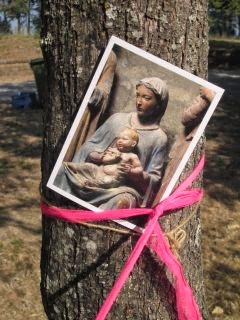On the 9th of June, Oradour-sur-Glane was a typical French village with cafes, hairdressers, bakeries, a church and so on. People were busy doing whatever it is that they normally do, albeit during a German occupation. Within twenty four hours everything was not normal.
As an act of retribution, sparked off by the killing of a German officer, Nazi troops swept into the village. The men were shot against various walls and the women and children were locked in the church. Then the town and church were set alight. 642 people were killed: 197 men, 240 women and 204 children.
The village, in its ruins, with crumpled cars, twisted bed frames, rusted sewing machines and dangling electric wires has been preserved as it was found and is now a memorial to the Martyrs. A sign requesting silence is at the entrance to the site. Visitors wandered, shook their heads, took photos of the melted lump that was the church bell or the jagged skyline of broken buildings, wiped their eyes and blew their nose. People didn't make eye contact; they wrapped themselves in a personal protective bubble. The silence was palpable and uncomfortable. Perhaps too uncomfortable for the three Germans who chatted and joked and too inconvenient for the English man tying up a house deal on his mobile.
A large underground bunker was built to house the few personal items reclaimed from the rubble. The collections were displayed on glass shelves set in concrete that were lit from below. One display was several layers of melted glass shards: sundae dishes, wine glasses, a vase. Another held blackened wire-framed spectacles. Another, watches whose hands had stopped between 4pm and 5pm. So little of their full lives remained. Yet there were the odd survivors: a blonde curl tied in a ribbon, a baby's embroidered jacket, a short poem written in a disciplined script by Huguette to her Maman, with three little flowers painted at the top of the page.
I thought of the soldiers who herded these people to their deaths. They would have seen the colour of their eyes, smelt their perfume or sweat, heard their voices, their breathe, the rustle of their clothes, watched the women comfort the children.
How did they live their lives when everything returned to normal?
It was a shocking and terrible war crime. But as I type, isn't this happening in Africa, the Middle East, South America, the Far East? Women and children being raped, people having their lips and ears cut off, people being shot, hacked, exploded, and little children being trained to kill.
Oops. Oops. Oops. Somewhere we have made a huge mistake, just as the Nazi's did. Their officer had been killed in a different village altogether.









